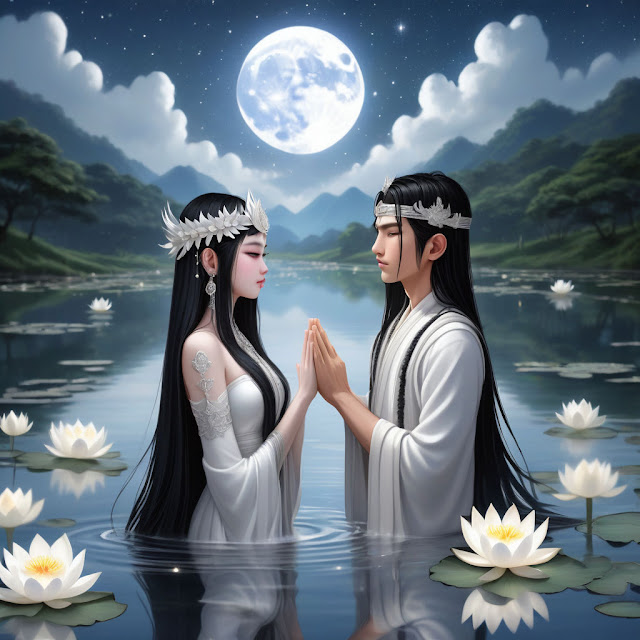Pandibulan or ablution refers to the ceremonial act of washing oneself or certain parts of the body, symbolizing spiritual purification. (Akin to Bicol folklore of the Lunar deity bathing in the waters of Bicol)
In Bicolano mythology, Pandibulan is associated with the lunar god Bulan. In these myths, Bulan is a god of the moon, often depicted as a beautiful androgynous and gentle deity. The myth goes that Bulan descended from the heavens, illuminating the night with his radiance. His presence brought tranquility and peace, often calming the creatures of the earth and the sea.
In some stories, Bulan's descent to earth is linked with other deities and significant events in Bicolano cosmology. He is sometimes portrayed as the younger brother of Haliya, the goddess of the moon and a warrior deity, who is often depicted as protecting Bulan from evil spirits. Bulan’s descent is seen as a symbol of the moon’s gentle influence on the earth, bringing light in the darkness and maintaining a balance in nature.
Pandibulan in Filipino folklore and culture
It refers to a supernatural creature or being associated with the moon (buwan in Tagalog). The name Pandibulan can be broken down into "Pandi" (potentially a form of the word "pangdi" meaning "for" or "of") and "bulan" (meaning "moon").
.png) |
| Felip in Bulan music video |
Pandibulan in Bicol mythology
Pandibulan also means to bathe under the moon, bathing by moonlight
a spiritual bath is "ritual cleansing" or "ablution" in various spiritual and religious contexts. It refers to the act of washing or bathing for purification or spiritual renewal rather than just physical cleanliness.
In Bicolano oral mythology, the practice of bathing by moonlight, particularly under the light of the full moon, is believed to be associated with beauty, youth, and rejuvenation. cleaning the spirit. This almost unknown tradition is closely connected to the lunar deity Bulan, who embodies purity, beauty, and tranquility.
According to the myth, those who bathe under the light of Bulan are said to be blessed with his ethereal beauty and ageless youth. The moonlight is believed to have a mystical power that can cleanse and rejuvenate, preserving one's physical appearance and vitality. This practice is often linked to the goddess Haliya as well, who is known for her beauty and strength. Some versions of the myth suggest that she herself bathes in the light of her brother Bulan to maintain her allure and power.
Orally passed mythologies and stories
In some tales, Pandibulan is a guardian or personification of the moon, while in others, it is the descend of Bulan, the luminous lunar god to the waters of Bicol. it may be a mythical being with powers tied to the lunar cycles. The term is not as widely recognized as other Filipino mythological figures, so interpretations and details may differ depending on local traditions and storytelling.
some Bicolano girls who would bathe under the moon are believed to become more youthful and radiant, absorbing the luminous glow of the moonlight.
 |
| Haliya and Bulan bathing in the waters of Bicol "ritual cleansing" or "ablution" |
The myth of Bulan and Haliya and his descent is a part of the rich Bicolano folklore, reflecting the cultural importance of celestial bodies and their influence on the world.



No comments:
Post a Comment
Note: Only a member of this blog may post a comment.